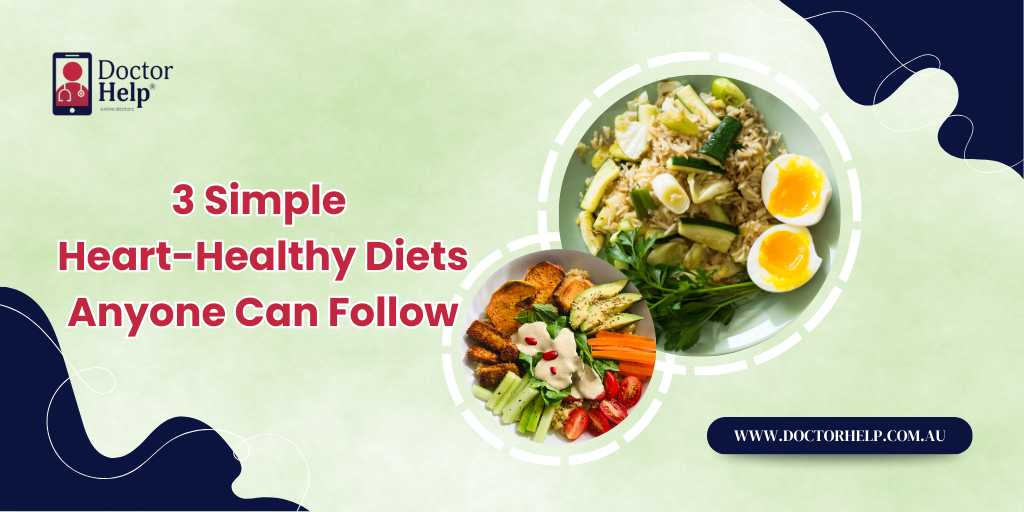“Your diet is a bank account. Good food choices are good investments” – Bethenny Frankel.
Table of Contents
According to the Australian Statistics Bureau, almost 6.7% of adults are living with one or more heart diseases in Australia. It is reported by ABS that the leading cause of death among Australians is heart attack. Every 18 minutes a person dies in Australia. There is no specific age for developing a heart disease, it can happen at any age. But we can lower its risk. How? Well, there are many ways to lower the risk of developing heart disease and one of them is eating heart-healthy meals.
That’s why the Australian Dietary Guidelines emphasize the importance of a balanced diet for heart health. So, if you are looking for a way to lower the risk of heart disease or if you already have a heart condition then you should start eating a heart-friendly diet.
But with all the buzz around “superfoods” and “miracle diets,” it can be hard to understand where to begin. Worry not, we are here for you. In this guide, we have explained heart-healthy diets usually recommended by Australian nutritionists.
Factors That Make Diet Heart-Healthy
You must be thinking, what’s a heart-healthy diet? A heart-healthy diet contains foods rich in vitamins, minerals, fiber, and antioxidants and low in saturated and trans fat.
Long story short, if you include fresh fruits, vegetables, lean proteins, nuts, legumes, and whole grains in your diet you can reduce the risk of developing heart disease. Healthy foods for a healthy heart!
Heart Friendly Diets
1. Mediterranean Diet
As the name suggests, this diet is inspired by Mediterranean cuisine. It focuses on plant-based foods, whole grains, legumes, heart-healthy fats (olive oil), lean proteins, fish, and some herbs. According to research, the Mediterranean diet can significantly reduce the risk of cardiovascular conditions like heart attacks and strokes. It also helps in balancing cholesterol levels. That is why it is frequently recommended by Australian nutritionists.
Key components of Mediterranean Diet
Fruits and vegetables contain many vital vitamins, minerals, and antioxidants. Eating fruits and vegetables also reduces blood pressure because they are rich in potassium and have minimal sodium content.
Whole grains form an essential part of this diet since they include brown rice barley and oats that deliver both fiber content and better blood cholesterol management.
Olive oil serves as the main fat providing monounsaturated fats that support cholesterol reduction in the body. It also contains anti-inflammatory properties which helps in reducing inflammation.
Nuts such as almonds and walnuts together with seeds including flaxseeds and chia seeds should be consumed regularly for obtaining omega-3 fatty acids beneficial to heart health.
2. DASH Diet
The DASH (Dietary Approaches to Stop Hypertension) Diet is a favorite among Australian health professionals, as it supports heart health. This diet focuses on fruits, vegetables, whole grains, lean proteins, and low-fat dairy. These foods fuel your body as they are enriched with essential vitamins and minerals. For example, bananas and spinach contain potassium. The DASH diet helps in lowering high blood pressure and cholesterol levels. It also helps in weight management.
Key Components of the DASH Diet:
- The essential component of the DASH diet includes controlling sodium consumption because it helps decrease blood pressure. Processed foods and those contained in packages should be limited while concentrating on eating natural fresh products.
- High Potassium and Magnesium together with Calcium in the diet support blood vessel function and help decrease hypertensive conditions.
- Lean proteins such as skinless poultry fish and legumes are included in the DASH diet to fulfill protein needs while avoiding fatty substances.
- The diet contains whole grains and vegetables that supply fiber which helps reduce cholesterol while supporting digestive well-being.
3. Plant-based Diet
A vegan diet focuses primarily on plant foods, including vegetables, fruits, legumes, grains, and nuts, while avoiding or minimizing animal products, this naturally reduces saturated cholesterol. According to an article published by the Journal of the American Heart Association, a plant-based diet lowers the risk of cardiovascular disease by 16%.
This diet is widely recommended by Australian nutritionists for its ability to lower cholesterol, blood pressure, and the risk of cardiovascular disease.
Avocados are a food for the heart. Studies have shown that eating avocados lowers the risk of CVDs. The leafy greens also play a role in supporting heart health by balancing sodium levels and lowering blood pressure.
Key Components of Plant-Based Diet:
- The basic food components of this diet include fruits, vegetables, legumes, nuts, and whole grains. Plants in this diet supply antioxidants and fibers which protect against inflammation while developing healthy arteries.
- Spinach, collard greens, kale, cabbage, broccoli, carrots, apples, bananas, oranges, pears, and grapes are good foods for the heart.
- Strategic planning of meals becomes crucial because it prevents protein deficiencies while enabling the intake of vitamin B12 and omega-3 fatty acids.
- Exploring Heart Foundation recipes can inspire you while ensuring your choices support long-term health.
Quick Heart-Healthy Tips for Aussies
Here are a few tips:
Create Balanced Meals
Use the Heart Foundation’s plate model as your guideline for meal composition.
- Your plate should contain a proportion of vegetables amounting to approximately half the available space.
- Intake of at least two portions of fruits each day.
- Legumes, fish, or poultry should occupy a quarter of your food plate.
- The remaining quarter of the plate should serve whole grains or starches such as sweet potato.
Limit Sodium
The average Australian intake is twice as much sodium as health guidelines permit. Instead of adding salt to your food, you should consider using spices and fresh herbs as well as garlic to enhance flavor.
Keep Moving
Getting 30 minutes of moderate exercise daily alongside proper nutrition plays equal roles in maintaining heart health together with diet management.
Final Note
Good heart health starts with what’s on your plate. Eating leafy greens, whole grains oily fish together with nuts and seeds as well as legumes serves as an active step that leads to both prolonged life and happiness. Single sustainable choices you make now in your diet will benefit your body while providing the added benefit of protecting your heart.
Looking for more guidance on your heart-healthy food journey? Book an appointment with an online doctor today.
References:
Key statistics: Heart disease | Heart Foundation. (n.d.).
https://www.heartfoundation.org.au/your-heart/evidence-and-statistics/australia-heart-disease-statistics
Professional, C. C. M. (2025, April 22). Mediterranean Diet. Cleveland Clinic.
https://my.clevelandclinic.org/health/articles/16037-mediterranean-diet
How to make the DASH diet work for you. (n.d.). Mayo Clinic.
https://www.mayoclinic.org/healthy-lifestyle/nutrition-and-healthy-eating/in-depth/dash-diet/art-20048456#:~:text=The%20DASH%20diet%20focuses%20on,and%20full%2Dfat%20dairy%20products
Kim, H., Caulfield, L. E., Garcia‐Larsen, V., Steffen, L. M., Coresh, J., & Rebholz, C. M. (2019). Plant‐Based diets are associated with a lower risk of incident cardiovascular disease, cardiovascular disease mortality, and All‐Cause mortality in a general population of Middle‐Aged adults. Journal of the American Heart Association, 8(16).
https://doi.org/10.1161/jaha.119.012865
Eating two servings of avocados a week linked to lower risk of cardiovascular disease. (n.d.). American Heart Association.
https://newsroom.heart.org/news/eating-two-servings-of-avocados-a-week-linked-to-lower-risk-of-cardiovascular-disease
How to follow a heart healthy eating pattern. (n.d.). Heart Foundation.
https://www.heartfoundation.org.au/healthy-living/healthy-eating/heart-healthy-eating-pattern
Choose Heart-Healthy Foods | NHLBI, NIH. (2022, March 24). NHLBI, NIH.
https://www.nhlbi.nih.gov/health/heart-healthy-living/healthy-foods#:~:text=Vegetables%20such%20as%20leafy%20greens,Tofu
Department of Health & Human Services. (n.d.). Salt. Better Health Channel.
https://www.betterhealth.vic.gov.au/health/healthyliving/salt










